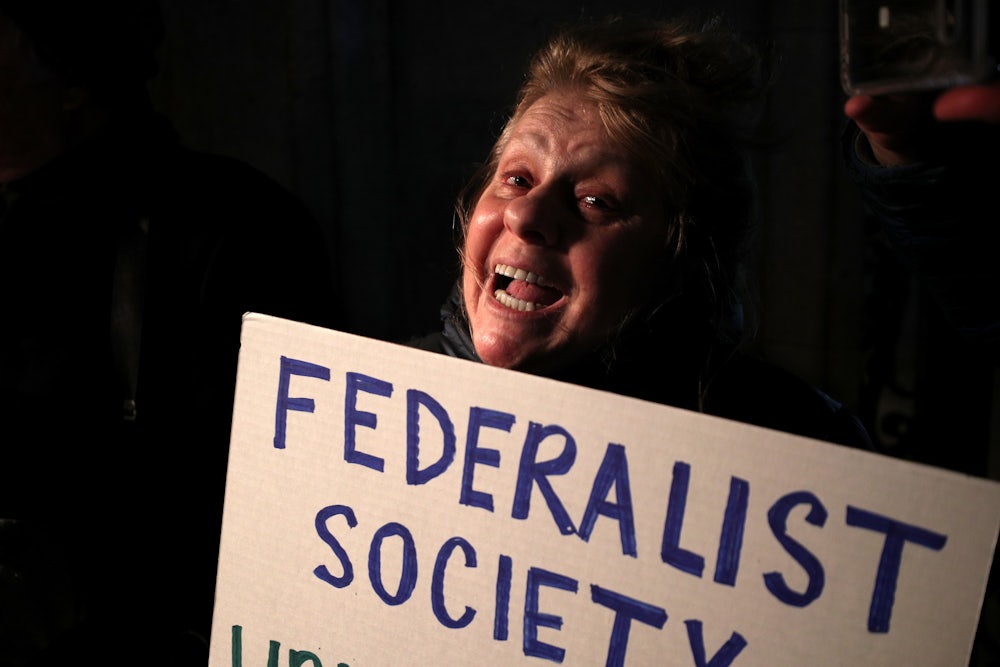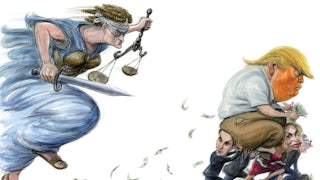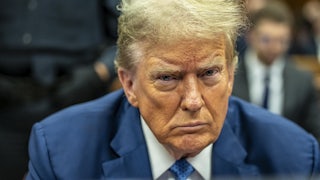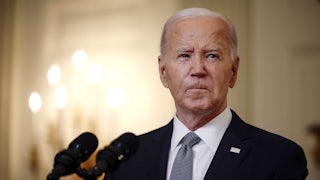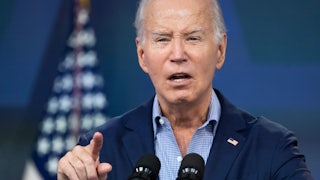There are roughly 14,000 law professors in America, so it is rarely newsworthy when one of them goes off the rails. But it is notable when one of them is Steven Calabresi.
The Northwestern University law professor was present at the creation of the conservative legal movement. When the Federalist Society came into existence in 1982, he co-founded one of its first chapters at Yale. Today he serves as co-chairman of the group’s board of directors alongside Leonard Leo, its judicial-appointment mastermind.
Within the span of less than a year, Calabresi has gone from endorsing the push to disqualify Trump from the November election to reversing himself and calling for Trump’s defeat at the ballot box instead, to, as of last week, embracing full-blown election denialism.
“Some Republicans, including me, therefore acquiesced in Joe Biden taking office because we thought we had to do that to preserve a facade of democracy absent concrete proof of vote fraud,” he wrote on The Volokh Conspiracy, a prominent legal blog hosted on Reason magazine’s website over the weekend. “But deep down in our guts we thought that Joe Biden’s campaign had probably won with dirty tricks, although that could not [be] proved in a court of law.”
Calabresi’s recent intellectual evolution is, to put it charitably, a notable marker in the conservative legal establishment’s relationship to Trumpism. Even as some members embraced his judicial nominees, others denounced his lack of fidelity to the Constitution and the rule of law. More than a few denounced him outright after January 6. But if Calabresi is any indication, they may find themselves embracing him anew—particularly as Election Day draws near.
Calabresi has taken some heterodox positions in recent years. He was among those who argued unsuccessfully that former special counsel Robert Mueller’s appointment to oversee the Russia investigation was illegal. He renewed those arguments recently against special counsel Jack Smith, who is overseeing the D.C. and Florida prosecutions of Trump on the former president’s role in the January 6 insurrection and his illegal retention of classified documents as a civilian, respectively.
At the same time, Calabresi was hardly a dyed-in-the-wool Trump loyalist. After the events of January 6, he penned a joint op-ed with Norm Eisen, a Brookings Institution senior fellow and prominent Trump critic, which argued that the Senate should convict Trump the day after a then-pending vote in the House to impeach him.
In the op-ed, they argued Trump should specifically be impeached for “inciting a violent insurrection against his own vice president, the Senate, and the House of Representatives,” as well as for pressuring then–Georgia Secretary of State Brad Raffensperger to “find” enough votes for him to win the state.
“He tried to steal the election and incited a mob to abet his wrongdoing,” Calabresi and Eisen wrote. “He is a danger to the nation and must be removed immediately and disqualified from ever holding public office again.”
Much of Calabresi’s recent writing has occurred on The Volokh Conspiracy. He began to publish regularly there last August, starting with a bombshell post of sorts: “Trump Is Disqualified From Being on Any Election Ballots.”
In that piece, Calabresi endorsed the stance taken by other originalist legal scholars that Section Three of the Fourteenth Amendment had disqualified Trump from holding future office. He explained how no criminal conviction for insurrection was necessary, how the amendment’s text was self-executing, and how it was compatible with support for American democracy. Calabresi even urged Trump’s rivals to file lawsuits so the Supreme Court could remove him from the ballot.
“Chris Christie is legally injured by Donald Trump’s name being on the ballot,” he wrote. “They draw from some similar voters. Christie should sue, if necessary, to get Trump’s name off the ballot. Then the Supreme Court can open the dictionary and tell us what we all already know—that Trump incited an insurrection and is disqualified from being on any primary or general election ballots next year.”
A month later, however, he changed his tune. Calabresi wrote a letter to the Wall Street Journal opinion section, which is basically the NextDoor for Federalist Society types, to announce that he was actually wrong. He claimed that he had been persuaded by an op-ed there by former Attorney General Michael Mukasey that claimed Trump was not an “officer of the United States” and therefore didn’t fall under the amendment’s terms.
This was a highly dubious argument, as I’ve noted before, and did not make sense on its own terms. Why on earth would the Fourteenth Amendment’s drafters disqualify ex-Confederates from serving as local dog-catchers but not as commander in chief? The Supreme Court ignored that argument in Trump v. Anderson earlier this year, though it ultimately torpedoed disqualification on other (also dubious) grounds. Even so, Calabresi emphasized at the time that he was not changing course on how he viewed January 6 itself.
“Let me, however, be very clear about one thing. I am a Never Trumper,” he wrote on Volokh then. “I will vote for any Republican in the primaries over Trump or, if necessary for the Democratic Party’s nominee for President over Donald Trump. I am a Never Trumper because of the former President’s behavior on January 6, 2021 when he stirred up a crowd, started a riot on Capitol Hill to disrupt the counting of electoral votes, and then declined to call off the riot either with a Tweet or by calling out the National Guard.”
In December, he took up the blog again to argue that Smith’s appointment as special counsel was “unconstitutional” and that the Supreme Court should reject a recent motion that Smith made on standing grounds. This was not completely out of character for Calabresi: After all, he opined that the Mueller appointment might be unlawful as well. And he emphasized that he wanted Trump to be tried in a way that couldn’t be overturned on appeal.
But things had already begun to shift. On January 6 of this year, he renounced his prior stance that the attack on the Capitol was an insurrection. “Two wrongs do not make a right,” he wrote. “The wrong that Trump committed on January 6, 2021 should not be used to perpetrate the additional wrong of keeping Trump off the ballot in 2024.”
The contrast between this perfunctory blog and his earlier, lengthier writings on the matter is stark. Instead of weighing precedent and text, he simply made a passing reference to the 1828 edition of Webster’s Dictionary and how it defined “rebellion,” which included the “taking of arms.” Calabresi claimed that since the attackers weren’t armed—they actually were—it didn’t count as an insurrection.
This is not particularly persuasive. Everybody understood what was happening at the time, including Calabresi. One cannot help but feel, while reading these posts, that they are watching a high-wire act. His writings seem less about persuading fellow conservatives that his understanding of the law and the Constitution is correct and more about proving that he is still on the same team as them.
Things only went downhill from there. In February, he claimed that Trump was actually the victim of “political witch hunts by Democrats suffering from Trump derangement syndrome.” He referred to Trump’s civil trial in New York as “Kafkaesque” and a “Stalinist nightmare.” In March, he wrote that “criminalizing politics” was a “threat to democracy.” Judge Aileen Cannon, the widely criticized judge overseeing the classified documents case in Florida, was described in one post as a “heroine.”
In one particularly strident post in May titled, “Trump Should NOT TESTIFY at MANHATTAN WITCH HUNT OF A TRIAL,” Calabresi wrote that the “the lying liberal jurors and new york state democrats will twist his words to convict him for lying under oath just like they did with Michael Flynn.” (Capitalizations his.) It came after Trump publicly suggested he might testify in his own defense. The two-paragraph post is more akin to a Facebook comment than a piece of legal scholarship, and it carries a distinct air of panic with it.
The dam finally broke on Saturday. In a strange post titled, “The Left’s Attack on the Secret Ballot and on Same Day Voting,” Calabresi embraced Trumpworld’s claims that Democrats had somehow rigged or corrupted the 2020 presidential election. He equated voting by mail with the abolition of the secret ballot and claimed that he didn’t believe the accuracy of Biden’s vote totals.
“I simply do not believe that in an honestly held traditionally run presidential election that Joe Biden would get 181,866 more votes for President in 2020 in Pennsylvania than Barack Obama got in 2008,” he wrote. (Emphasis his.) Pennsylvania’s population grew by more than 300,000 people between the 2010 and 2020 censuses, and Trump was one of the least popular major-party candidates of all time at the time. A few hours later, Calabresi claimed that he didn’t mean to suggest there was actual fraud.
Why the change of heart? A few factors seem to be at play here. One is that Calabresi was a staunch supporter of former South Carolina Governor Nikki Haley in the GOP primaries. (He even claimed that Ronald Reagan would vote for her over Trump.) When her candidacy ended, a few months ago, the prospect of actually supporting Biden over Trump became much more real than it was in January 2021 or August 2023, and his posts about the Trump cases turned much more hostile. Maybe he was bluffing all along.
Another factor appears to be the growing liberal criticism of the Supreme Court’s conservative majority. More than a few of Calabresi’s posts are defenses of Justices Clarence Thomas and Samuel Alito, who have been repeatedly accused of ethical lapses over the last year. “The Left is demanding that, because of their wives’ behavior, Justices Thomas and Alito should recuse themselves from Trump-related election cases,” he wrote earlier this month. “This outrageous demand just shows again that the Left is apoplectic that its 85 year choke hold on the Supreme Court majority has been broken.”
It speaks volumes about Calabresi’s own ideological views that he thinks “the Left” has controlled the Supreme Court since the 1930s. The court hasn’t had a five-justice liberal majority since 1969, and Republican presidents have appointed 15 of the 20 justices who’ve joined the court since Thurgood Marshall retired in 1991. His references to the left’s supposed “choke hold” over the Court also give away the game: He sees the ethics controversies not as a matter of judicial propriety but as a threat to his ideological project.
“I wrote last winter on this blog that Justice Thomas’s opinions show a steadfast devotion to the rule of law and are quite simply excellent on the merits,” Calabresi assured readers. “Not only is Justice Thomas incapable of being bribed, he is actually the best justice ever to serve on the Supreme Court in 234 years of American history. No one could read Justice Thomas’s opinions and fail to be impressed by them. It is obvious on the face of things that Justice Thomas would never alter a word that he writes because of a gift from a friend.”
Perceived audiences matter. I’ve written before that the conservative legal establishment is primarily a social network for chummy right-wing lawyers and their political and financial patrons. When I read Calabresi’s blogs, I don’t get the sense that he’s writing for me, or for the legal community in general, or for the wider American public. It seems like he’s writing for that close-knit group—and that he is desperately trying to get back in its good graces. That bodes poorly for the future of anti-Trump conservatism in the short term and the conservative legal community in the long run.
